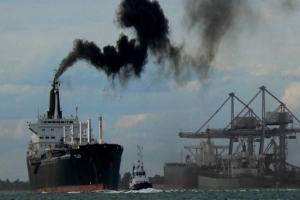


(Posted on 04/10/21)
ABB has joined more than 155 companies urging governments to help shipping decarbonize by 2050. The Call to Action for Shipping Decarbonization has been signed by more than 150 industry stakeholders and seeks significantly faster reduction in greenhouse gas (GHG) emissions than the International Maritime Organization’s (IMO) current ambition, which aims for a 50 percent reduction by 2050.
Ahead of the intergovernmental COP26 climate negotiations in November, the call asks national governments to deliver the policies that will supercharge the energy transition and make zero emission shipping the default choice by 2030. Specifically, signatories representing the entire maritime value chain - including shipping, cargo, energy, finance, ports, and infrastructure - requests that world leaders:
The Call to Action for Shipping Decarbonization has been developed by a multi-stakeholder taskforce convened by the Getting to Zero Coalition – a partnership between the Global Maritime Forum, the World Economic Forum, and Friends of Ocean Action. Members of the taskforce include Cargill Ocean Transportation, Citi, the COP26 Climate Champions team, the Energy Transitions Commission, Lloyd’s Register, Port of Antwerp, Torvald Klaveness, Trafigura, Yara, and UMAS.
ABB Marine & Ports Head of Regulatory Affairs Eero Lehtovaara added: “ABB Marine & Ports is committed to supporting the shipping industry’s decarbonization agenda with technologies that allow cleaner and more efficient operations. Already today, technologies are available to ensure low- and zero-emission operation of vessels sailing over shorter distances and in coastal areas, while significant progress is being made to support ocean-going ships today and in the future.”
ABB Turbocharging Senior Vice President Christoph Rofka said: “Not only do we wholeheartedly support these objectives, but we are in a position to provide technology that makes this transition possible today. Turbocharging is crucial to ensuring that many clean fuel candidates can be used effectively. As a leader in this field, ABB Turbocharging is delighted to ally with other leaders across the industry to realize the rapid decarbonization of shipping.”
Vessel designs vary significantly, each dictated by the vessel’s application and purpose. The technologies that will be selected for a particular project will be dictated by the needs and operational profile of the vessel. It is vital that ship owners and operators identify the proper solution for their vessel, whether using conventional diesel engine arrangement, a combination of low or zero-emission technologies, or a carbon-free solution.
Leading vessel performance platform Smart Ship Hub says the industry should expect a breakthrough year... Read more
The Nordic countries are taking an important step towards decarbonising maritime transport with the... Read more
Germany’s Steelpaint has appointed ADD Marine as its representative for Greece and Cyprus, strengthening... Read more
Rio Tinto’s first Pilbara-made iron ore rail car has rolled off the production line in Karratha... Read more
Precision meets progress at Phu My Port, Vietnam. The LPS 550 has been deployed to handle bulk commodities... Read more
bound4blue, a global leader in wind propulsion systems, has expanded its industrial footprint in Asia... Read more
As the industry explores multiple decarbonisation pathways, methanol is gaining attention as a practical... Read more
Technology group Wärtsilä will supply an integrated hybrid propulsion system for a bulk carrier... Read more
Superior Industries, Inc., a US-based manufacturer and global supplier of bulk material processing and... Read more
ESL Shipping has taken a significant step forward in digitalisation by deploying a new multichannel... Read more